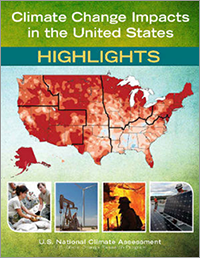
PSL's Mike Alexander contributes to the 3rd National Climate Assessment (Credit: Barb DeLuisi, NOAA)
|

The assessment report was released on May 6th.
|
Mike Alexander contributor to 3rd National Climate Assessment
May 7, 2014
Meteorologist Mike Alexander of ESRL's Physical Sciences Laboratory was asked about his contribution to the U.S. Global Change Research Program's 3rd National Climate Assessment (NCA), which was released last week. The report is a compilation of scientific information on climate change from multiple sources and institutions and is a valuable resource in communicating and understanding climate change science and the impacts of climate change on the United States. Alexander is a lead author of Chapter 24: Oceans and Marine Resources:
What was your main contribution to the development of the Oceans and Marine Resources chapter in The Third National Climate Assessment?
MA: My main contribution was in describing the physical changes in the ocean that have occurred or may occur in the future due to increasing greenhouse gases. This mainly focused on changes in temperature, which influences marine biology in a number of ways including changing the stratification which can impact the amount of nutrients reaching the surface. There are other changes that are underway including sea level rise, freshening (less salty) at high latitudes, and a decrease in sea ice.
What were the main messages from your work in this chapter, and why are these messages important to the public?
MA: We depend on the ocean from an economic stand point and from an appreciation of nature; human induced climate change will impact both as temperatures rise and as the oceans become more acidic. For example, it’s clear that coral reefs are under great threat. Many cultures depend on the reefs as a main source of food as does the tourism industry. They are also incredibly diverse ecosystems and are simply beautiful.
How will your contribution to this chapter in particular be used by policymakers and scientists?
MA: My hope is that my contribution to the Oceans and Marine Resources chapter will put the physical changes that are occurring in the ocean due to increased greenhouses gases into a broader context, so managers and scientists can more easily understand and relate to the effects of greenhouse gases on the ocean.
Related Links
- Read about all three NOAA Research contributors at: NOAA Research News
- NOAA News: Obama Administration releases Third National Climate Assessment for the United States
- For more information, please contact Monica Allen, director of public affairs for NOAA Research, Phone: (301) 734-1123.